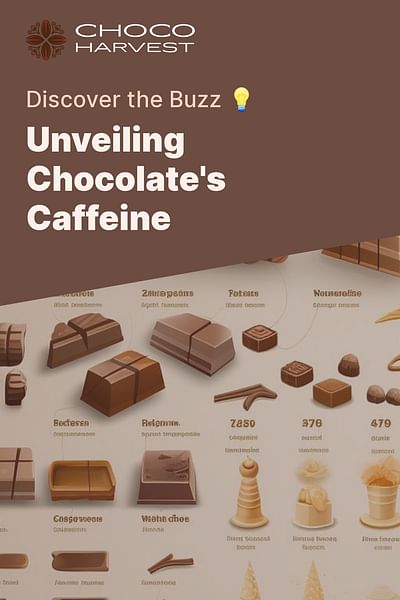Joe Parker is a renowned food critic with a particular fondness for chocolate. He has evaluated and critiqued chocolates from around the globe. His critiques are sincere, comprehensive, and imbued with his own unique flair. Joe's insights are not just informative but also engaging, making every chocolate adventure a delightful experience.
Many of us have wondered: does chocolate have caffeine? The straightforward answer to this is, yes, chocolate does contain caffeine but the amount varies depending on the type of chocolate. Now, let's delve deeper into this topic and explore the caffeine content in various types of chocolate.
🍫 Unwrapping the Mystery: How Much Caffeine is in Your Chocolate?
Not all chocolates are created equal when it comes to caffeine content. The general rule of thumb is: the darker the chocolate, the higher the caffeine content. For instance, dark chocolate has more caffeine than milk chocolate. White chocolate, on the other hand, contains negligible amounts of caffeine as it's made from cocoa butter rather than cocoa solids.
Caffeine Content in Different Types of Chocolate
To illustrate this, let's take a look at the following table comparing the caffeine content in different types of chocolate:
| Type of Chocolate | Caffeine Content per 1-ounce piece | |
|---|---|---|
| Dark Chocolate (70-85% cocoa) | 12 mg | ☕️☕️☕️ |
| Milk Chocolate | 5 mg | ☕️☕️ |
| White Chocolate | < 1 mg | ☕️ |
As you can see from the table above, a 1-ounce piece of dark chocolate contains about 12 milligrams of caffeine, while milk chocolate and white chocolate contain significantly less caffeine.
As you can see from the table above, a 1-ounce piece of dark chocolate contains about 12 milligrams of caffeine, while the same amount of milk chocolate has only about 5 milligrams. To put this into perspective, an 8-ounce cup of coffee contains around 95 milligrams of caffeine. So, you'd have to consume quite a lot of chocolate to match the caffeine content in a cup of joe!
Behind the Beans: What Influences the Caffeine Kick in Your Chocolate? 🌱
The caffeine content in chocolate can be influenced by a variety of factors, including the type of cocoa beans used, the chocolate-making process, and the percentage of cocoa in the chocolate. For instance, chocolates made from Forastero cocoa beans, which are the most common type of cocoa beans, usually have a lower caffeine content than those made from Criollo or Trinitario beans.
Caffeine Content in Chocolate Quiz
Test your knowledge about the factors affecting the caffeine content in chocolate.
Learn more about Caffeine Content in Chocolate Quiz 🍫 or discover other Choco Harvest quizzes.
Another key factor is the chocolate-making process. The caffeine content can vary depending on how the cocoa beans are roasted, ground, and processed into chocolate. Generally, the less processed the chocolate, the higher the caffeine content.
🌙 Sweet Dreams or Sleepless Nights: Can Chocolate's Caffeine Keep You Up?
Given that chocolate contains caffeine, you might be wondering: can eating chocolate keep you awake? Well, the answer to this depends on your individual sensitivity to caffeine. Some people might feel a slight energy boost after eating dark chocolate, while others might not notice any effect. However, it's unlikely that the caffeine in chocolate would have a strong enough effect to keep most people awake, especially compared to the caffeine content in coffee or energy drinks.
Does eating chocolate affect your sleep?
We're curious about your experiences with chocolate and sleep. Does eating chocolate, particularly in the evening, affect your sleep quality or ability to fall asleep? Share your experiences with us!















